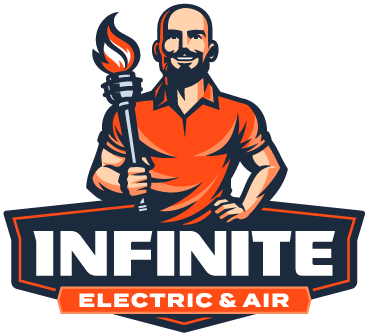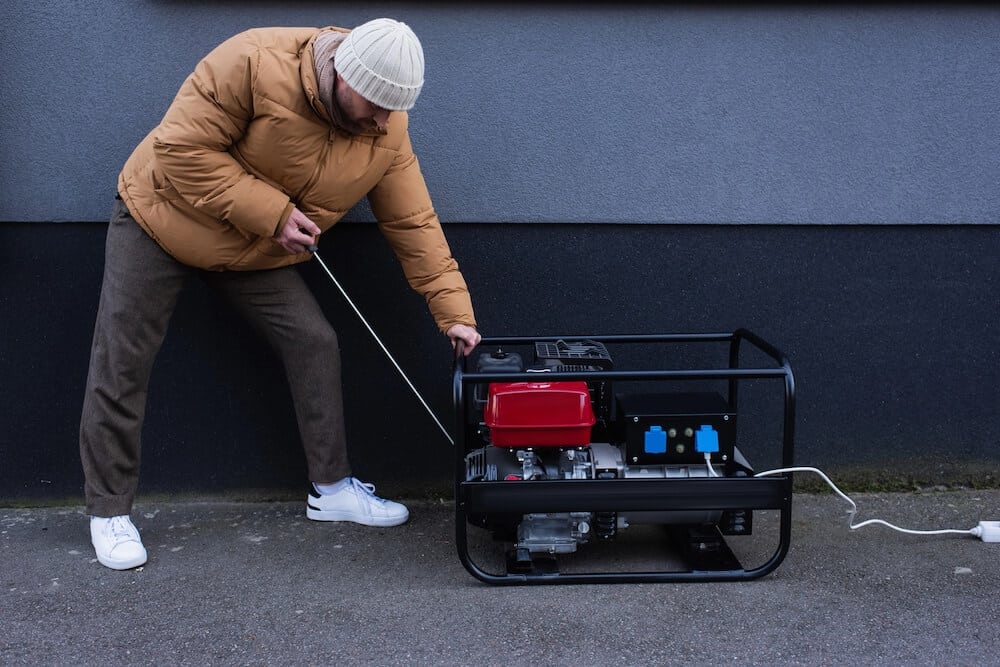When hurricane season rolls around in Southwest Florida, portable generators fly off store shelves faster than bottled water. For residents in Cape Coral, Fort Myers, Naples, and surrounding communities, these backup power sources seem like essential hurricane preparedness equipment. However, what many homeowners don’t realize is that portable generators pose serious risks that can turn a temporary power outage into a life-threatening emergency.
At Infinite Electric & Air, we’ve seen firsthand the devastating consequences of improper generator use throughout SW Florida. While portable generators can provide crucial backup power during storms, understanding their dangers and following proper safety protocols is essential for protecting your family and property.
Why Portable Generators Are So Dangerous
Portable generators are essentially small engines that produce electricity—and with that comes carbon monoxide, heat, electrical hazards, and fire risks. Unlike permanently installed standby generators with built-in safety features, portable units require careful handling and constant vigilance.
Carbon Monoxide Poisoning: The Silent Killer
Carbon monoxide (CO) is an odorless, colorless gas that portable generators produce in large quantities. This deadly gas can kill you and your family within minutes, and it’s the leading cause of generator-related deaths in Florida and nationwide.
The statistics are alarming:
- The Consumer Product Safety Commission reports that portable generators cause an average of 85 carbon monoxide poisoning deaths annually in the United States
- Florida consistently ranks among the top states for generator-related CO poisoning, especially following hurricanes
- Many victims are found dead in their homes or garages, often within hours of using a generator incorrectly
The problem intensifies in Southwest Florida’s climate. During hurricane season, our hot and humid weather means people keep doors and windows closed to maintain whatever cool air they have. This creates a dangerous situation where CO can seep into homes through cracks, windows, and doors—even when the generator is placed outside.
Common CO poisoning scenarios we see in SW Florida:
- Generators placed too close to homes (within 20 feet)
- Running generators in garages with doors open, believing airflow is sufficient
- Placing generators on covered porches or under eaves during rain
- Operating generators near air conditioning units, which can draw CO inside
Carbon monoxide symptoms mimic the flu: headaches, dizziness, weakness, nausea, and confusion. By the time you recognize these symptoms, it may be too late. CO poisoning can cause permanent brain damage or death, and children and pets are especially vulnerable due to their smaller size and faster breathing rates.
Electrical Hazards and Electrocution Risks
Beyond carbon monoxide, portable generators present serious electrical dangers that many Southwest Florida residents underestimate. Improper connections, wet conditions, and overloading can lead to electrocution, equipment damage, and house fires.
Backfeeding: A Deadly Mistake
One of the most dangerous practices is “backfeeding”—plugging a generator directly into a wall outlet to power your home. This bypasses your electrical panel’s safety systems and can:
- Electrocute utility workers trying to restore power in your neighborhood
- Cause fires in your home’s electrical system
- Damage appliances and electronics throughout your house
- Violate electrical codes and void your homeowner’s insurance
Southwest Florida experiences frequent power outages during hurricane season, and the temptation to quickly restore power by backfeeding is strong. However, this shortcut can be fatal for line workers and devastating for your home’s electrical system.
Water and Electricity: A Dangerous Combination
Florida’s summer storms and hurricanes create persistently wet conditions—exactly when you need your generator most. Operating portable generators in wet conditions dramatically increases electrocution risk:
- Never operate a generator in rain or standing water
- Don’t touch generators with wet hands
- Use Ground Fault Circuit Interrupter (GFCI) protection on all outlets
- Keep generators on dry, elevated surfaces during flooding
Many SW Florida residents learned hard lessons during Hurricane Ian, when flooding and prolonged power outages created perfect conditions for generator accidents. Running a generator on a wet surface or in the rain can electrocute the operator or anyone who touches the unit.
Fire Hazards: When Backup Power Becomes a Fire Starter
Portable generators produce extreme heat and use highly flammable fuel, creating multiple fire risks that are especially concerning in our hot Florida climate.
Fuel Storage and Handling Dangers
Gasoline and diesel fuel are volatile, particularly in Southwest Florida’s heat. Common fire hazards include:
- Storing excessive fuel in garages or sheds where temperatures exceed 100°F
- Refueling hot generators, which can ignite gasoline vapors
- Spilling fuel near the generator’s hot engine or exhaust
- Using old or contaminated fuel that increases engine malfunction risks
After hurricanes, gas stations in SW Florida often have long lines or run out of fuel entirely. This leads people to stockpile gasoline in unsafe containers or quantities, dramatically increasing fire risk in their homes.
Safe fuel storage guidelines:
- Store no more than 5 gallons at home in approved containers
- Keep fuel in a cool, well-ventilated area away from living spaces
- Never store fuel in your house, garage, or near ignition sources
- Replace stored fuel every 30 days to prevent degradation
Overheating and Exhaust Fires
Generator exhaust systems reach temperatures of 500°F or higher. Placing generators near combustible materials is a recipe for disaster:
- Keep generators at least 10 feet from your home, windows, and doors
- Never place generators on wooden decks or near vinyl siding
- Ensure adequate clearance from trees, bushes, and landscaping
- Position generators away from your air conditioning unit and propane tanks
Noise Pollution and Neighborhood Conflicts
While not life-threatening, portable generator noise creates significant problems in Southwest Florida’s tight-knit communities. These units typically produce 70-100 decibels—as loud as a lawnmower or chainsaw.
During extended outages following hurricanes, the constant drone of multiple generators can:
- Strain relationships with neighbors
- Violate local noise ordinances in Cape Coral, Fort Myers, and other municipalities
- Prevent sleep and recovery during already stressful situations
- Make it difficult to hear emergency announcements or warnings
Some Southwest Florida HOAs have specific regulations about generator use, including permitted hours and noise limits. Check your community rules before purchasing a portable generator.
Equipment Damage and Costly Repairs
Portable generators often damage the very appliances and systems they’re meant to protect. The electricity they produce isn’t as “clean” or stable as utility power, leading to:
Power Quality Issues
- Voltage fluctuations that damage sensitive electronics
- Frequency variations that harm motors in AC units and refrigerators
- Insufficient grounding that causes equipment malfunction
- Power surges when starting or stopping the generator
In Southwest Florida, protecting your air conditioning system is paramount. Running your AC on undersized or improper generator power can destroy the compressor—a repair costing $2,000-$4,000 or more.
Sizing Problems
Most homeowners underestimate their power needs or overestimate their generator’s capabilities:
- Underpowered generators can’t start large appliances like AC units or well pumps
- Overloaded generators burn out quickly, leaving you without power
- Constant overload creates fire risks and premature engine failure
A typical Southwest Florida home requires 20,000-30,000 watts to run essential systems including air conditioning. Most portable generators produce only 3,000-8,000 watts, making them inadequate for whole-home backup power.
The Legal and Insurance Implications
Using portable generators improperly can have serious legal and financial consequences that many SW Florida residents overlook:
Code Violations and Fines
- Operating generators without proper permits (required for permanent connections)
- Violating local noise ordinances during extended outages
- Creating hazards that violate Florida building and electrical codes
- Risking citations from code enforcement in your municipality
Insurance Issues
- Homeowner’s insurance may not cover damage from improper generator use
- Fires or CO poisoning from generator misuse can void coverage
- Damage to utility equipment from backfeeding can result in personal liability
- Medical expenses from generator-related injuries often aren’t covered
After Hurricane Ian, several Southwest Florida insurance companies denied claims related to generator fires and carbon monoxide incidents, citing improper use and safety violations.
The Superior Alternative: Whole-Home Standby Generators
Given the serious risks of portable generators, Southwest Florida homeowners should consider professionally installed standby generators as a safer, more reliable alternative.
Why Standby Generators Are Safer
- Permanently installed outside with proper clearances
- Automatic carbon monoxide detection and shutdown
- Professional electrical connection with transfer switches
- Weather-resistant enclosures designed for Florida’s climate
- Continuous fuel supply from natural gas or propane lines
- Automatic startup when power fails—no manual operation needed
Long-Term Value for SW Florida Homes
While standby generators require a larger upfront investment ($5,000-$15,000 installed), they provide:
- Increased home value and appeal to buyers in hurricane-prone areas
- Lower insurance premiums from some carriers
- Whole-home power including air conditioning—critical in Florida’s heat
- Peace of mind during evacuations or extended absences
- No fuel storage, refueling, or constant monitoring required
For Southwest Florida residents facing annual hurricane threats and frequent summer storms, the investment in a standby generator system pays dividends in safety, convenience, and property protection.
If You Must Use a Portable Generator: Essential Safety Rules
If a portable generator is your only option, follow these critical safety guidelines:
- Carbon Monoxide Protection: Place generators at least 20 feet from your home, never in garages or enclosed spaces, even with doors open. Install battery-operated CO detectors in your home.
- Electrical Safety: Use a manual transfer switch installed by a licensed electrician—never backfeed through outlets. Use heavy-duty, outdoor-rated extension cords for individual appliances.
- Fuel Safety: Refuel only when the generator is cool and turned off. Store fuel properly and never exceed recommended storage quantities.
- Weather Protection: Use a generator tent or canopy designed for the purpose—never operate in rain or wet conditions without proper protection.
- Proper Grounding: Ensure your generator is properly grounded according to manufacturer specifications to prevent electrocution.
- Regular Maintenance: Test your generator monthly and perform recommended maintenance to ensure it works when needed.
Protect Your Southwest Florida Home the Right Way
At Infinite Electric & Air, we understand that backup power is essential for Southwest Florida living. However, we also know that portable generators create serious risks that can turn power outages into tragedies.
Whether you’re considering purchasing a portable generator or ready to invest in a safer standby system, our licensed electricians can help you make the right choice for your home and family. We provide:
- Free consultations on backup power options
- Professional standby generator installation throughout SW Florida
- Proper transfer switch installation for portable generators
- Electrical system evaluations to ensure safe generator operation
- Ongoing maintenance and support for all generator systems
Don’t let hurricane season catch you unprepared—or put your family at risk with an improperly used portable generator. Contact Infinite Electric & Air today to discuss safe, reliable backup power solutions for your Southwest Florida home.

